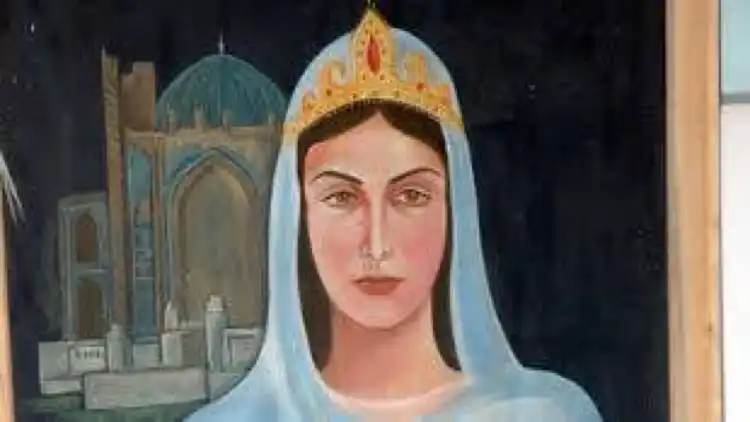
Ghaus Siwani
As the Taliban try to impose an Arab-type culture on Afghanistan, the people are showing their disapproval by visiting the tomb of an Afghan legend who was the first Persian poet, celebrated love and died defending her freedom, 800 years ago.
The tomb of Rabia Balkhi, located in Balkh, conveys a message of courage and bravery of the Afghan women. Born in Khasdar Rabia was educated to the level she could express herself in poerty; was good in painting, swordsmanship and horse riding. There are several schools and hospitals named after her. Parents in Afghanistan give Rabia name to their girls. A university in Kabul is also named after her.
Rabia is also known as Rabia Khuzdari. This name is after her native place Khasdar in Balkh province.In around 1990, Khuzdar Town Committee had changed the name of the 3-km Zinda Pir Road to Rabia Khuzdari Road.
Why Rabia is considered an epitome of courage and love?
There is a story behind it and that may look like a perfect script for a Bollywood movie. Rabia belonged to a wealthy Arab family that had settled in Balkh. There is no clarity on Rabia's date of birth. However, it is estimated that she was born around 940 AD.
Rabia’s father Amir Ka’ab was a wealthy man of Balkh; the family lived in comfort and enjoyed a luxurious life. Rabia was educated and she had inclination to poetry. She was not only felicitated by the literary class but also the royal poet of the contemporary Samadhi Empire Rudaki appreciated her writings. He was impressed by Rabia's poetry, power of language and eloquence.
Amir Ka'ab had bequeathed to his son and heir apparent Haris during his illness that he should take care of his sister and arrange her marriage to a man of high lineage. Later during a feast, Rabia saw a butler moving around among the women. He turned out to be a Turkish slave named Bakhtash.
Rabia had fallen in love with Bakhtash.
Rabia's maid servant acted as a messenger between her and Baktash. She never keep track of the letters she wrote to her lover. Kissing was not allowed back then. Now Rabia’s poetry was all about her first love and her beau; she expressed her joy, sorrow, pinning for her lover through words.
Her pure emotions turned into word and there was no way the romantic Persian literati of those days would not celebrate this woman poet.
One day Rabia looked sad as she was walking in the garden while reciting a poem in Baktash's memory when her brother Harris sensed something was not quite right.
He used to take part in city gatherings where his sister's romantic poetry was recited and applauded.
He researched into it and found about the love story of Rabia and Bakhtash. An enraged Harris ordered the arrest of Rabia and Bakhtash. Both were imprisoned yet their passion and love didn’t subside.
Rabia’s brother ordered her wrists be slashed so that she bleeds to death.
Rabia wrote her last poem with the blood oozing from her wrist on the wall of her prison cell.
Rabia's story and her poetry are part of the Afghan culture and tradition. Her love story has influenced many a generation of Afghans.
Even today, those who know Persian language read and listen to Rabia's poetry. A film on her story was made in Persian.
Her grave is visited by people even today.
ALSO READ: Afghan women take Twitter by storm
